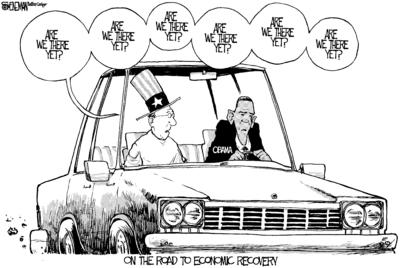- MENU
- HOME
- SEARCH
- VIDEOS
- WORLD
- MAIN
- AFRICA
- ASIA
- BALKANS
- EUROPE
- LATIN AMERICA
- MIDDLE EAST
- United Kingdom
- United States
- Argentina
- Australia
- Austria
- Benelux
- Brazil
- Canada
- China
- France
- Germany
- Greece
- Hungary
- India
- Indonesia
- Ireland
- Israel
- Italy
- Japan
- Korea
- Mexico
- New Zealand
- Pakistan
- Philippines
- Poland
- Russia
- South Africa
- Spain
- Taiwan
- Turkey
- USA
- BUSINESS
- WEALTH
- STOCKS
- TECH
- HEALTH
- LIFESTYLE
- ENTERTAINMENT
- SPORTS
- RSS
- iHaveNet.com: Economy
by Paul A. Samuelson

The latest word from the U.S. Federal Reserve is that already or soon, our overall economy will cease to be falling. Instead, it will stabilize.
What does this not mean? This says nothing about how fast America will move back up toward the 2008 level where it had been before the recession meltdown.
Indeed the Fed itself and the majority of the consensus forecasters fear that this expected recovery might be a weak one that does little to reduce Main Street's unemployment. And it may also imply that future private consumer and investment spending will continue to be anemic.
That would mean that at the global level there might not be the replay of the old-time drama in which the American locomotive comes to the rescue of depressed economies.
Once upon a time, when America produced almost half of total global output, it was appropriate to concentrate mostly on America's role vis-a-vis the rest of the world. Those days are gone forever.
China already has a purchasing power total GDP that exceeds Japan's. So long as China continues to grow twice as fast in total percentage rate of growth, the time will come all too soon when China's total GDP will be at parity with America's. When that occurs, China's per capita standard of life will still be only about one-fourth of America's and might be only a third of Japan's per capita level of well being.
The lack of exact predictability of economic history is what makes it so intriguing to macroeconomic scholars like me. Here is one dramatic example. Both Germany and France have done better during the current meltdown than the rest of the
Who expected that from two societies whose workforce toiled so few days per year, and which have had to cope with powerful trade unions?
When relatively good economic performance occurs in Germany and France, that puts upward pressure on the strength of the euro currency. Alas, that makes Italy, Spain and Baltic countries in Europe suffer.
One might be tempted to think that the French and German locomotives would pull up the rest of the
Let me guess what 2010 and 2011 might be like, globally and in the U.S.
First, maybe at even odds, the recoveries here and abroad could be strong -- just as they used to be normally, and particularly at the end of the stagflation of the 1970s.
Such a strong outcome would vindicate the unorthodox stimulus spending by central banks and treasurers against the old advice of "don't interfere" of 1929-1933 President Herbert Hoover, recently renewed by such libertarian experts as the late Milton Friedman.
Yes, the old-time independence of the central bank, espoused by Federal Reserve Chairman Ben Bernanke before the global meltdown, has been permanently weakened by recent necessary rescue plans. Times change and, perforce, we have to change with them.
But turn now to the possibility of a plateau during which there persists a chronic slump. A good example is Japan's Lost Decade after its 1990 real estate and stock markets went from up bubbles to down bubbles simultaneously.
The Obama economic team could not tolerate that gloomy scenario. Once again new rescue funds would have to be resorted to.
Are such acts of desperation free of future inflation pressures? Of course not. Somewhere down the line energy prices might spike upward. In the 2010-2015 epoch, China and other holders of recycled dollar assets will lose confidence in the dollar as a reserve currency.
China -- and Japan, etc. -- would be well advised to abandon lowest interest rate U.S. Treasury bills in favor of diversified global portfolios. That would induce a substantial depreciation of the dollar. U.S. consumer and producer price indexes would be raised by such a run against the dollar.
What can be the final verdict of an informed jury of voters and government officials?
Realism compels me to report that there are no sure outcomes. Now, as always, painful tradeoffs are inevitable. As a patriotic citizen I am thankful that the tragic mistakes of 1929-1933 have been avoided in this terrible time of genuine distress.
© Tribune Media Services
WORLD | AFRICA | ASIA | EUROPE | LATIN AMERICA | MIDDLE EAST | UNITED STATES | ECONOMY | EDUCATION | ENVIRONMENT | FOREIGN POLICY | POLITICS
Economy: Past Stormy Weather and What May Follow - Paul A. Samuelson